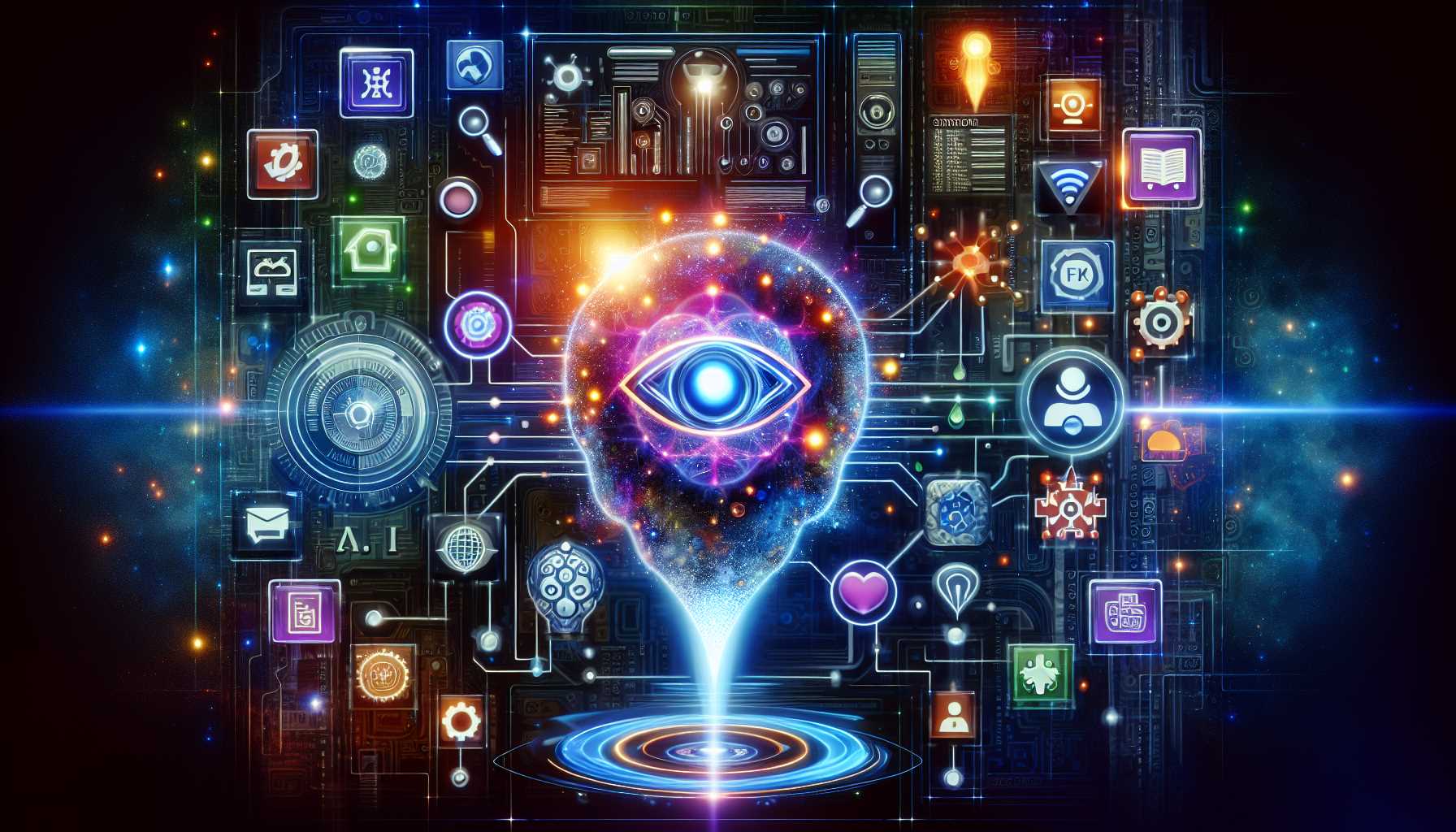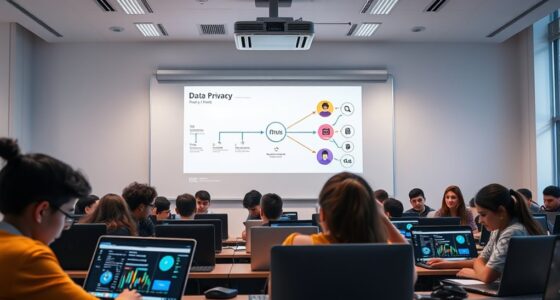Artificial Intelligence (AI) is rapidly transforming various aspects of our daily lives, education included. In the context of higher education, AI presents the opportunity to revolutionize how students learn and educators teach. Integrating AI into university curricula opens doors to a new era of learning, promising to enrich the educational experience for all involved.
Traditionally, university education has focused on teaching students skills that are becoming less relevant in today’s technologically advanced world. AI has the capability to perform tasks more efficiently, freeing up time for educators to emphasize the human qualities that set us apart, such as compassion, critical thinking, and collaboration. By incorporating AI into university education, we can strike a balance between leveraging the benefits of technology and nurturing these essential human skills.
One of the major challenges in modern education is the shortage of qualified teachers and the need to update outdated classroom methods. AI can help address these challenges by offering personalized learning experiences for students and automating administrative tasks for educators. By tailoring education to individual needs and preferences, AI can foster a more engaging and effective learning environment.
Overall, AI has the potential to transform education at the university level by empowering both teachers and learners. However, it is essential to navigate the integration of AI in a responsible and ethical manner, ensuring that it enhances education rather than perpetuates inequalities or biases. As we explore the potential of AI in university education, we must prioritize transparency, fairness, and the well-being of students and educators.
Key Takeaways:
- AI has the potential to revolutionize university education by optimizing the learning experience.
- Integrating AI into the curriculum can balance technological advancements with essential human skills.
- AI can address challenges such as teacher shortage and outdated classroom methods.
- Personalized learning experiences and automated tasks are among the benefits of AI in education.
- Responsible and ethical implementation of AI in education is essential for its success.
The Role of AI in Transforming Education
Artificial Intelligence (AI) has the potential to revolutionize education by offering transformative solutions for both teachers and students. With AI, teachers can save time by automating tasks such as lesson planning and assessment. AI can also provide personalized support to students, tailoring educational experiences to their individual needs and preferences. The future of AI in universities holds exciting possibilities for improving education and preparing students for the challenges of the future.
One of the key benefits of AI in university learning is its ability to save teachers time. By automating administrative tasks like grading and assessment, teachers can focus more on meaningful aspects of their work, such as providing guidance and mentorship to students. This allows for a more personalized and engaging learning experience.
Additionally, AI-driven education systems can enhance the learning process by making it more engaging and effective. Through personalized learning experiences, AI can adapt to each student’s unique learning style and pace, ensuring that they get the most out of their educational journey. AI-powered tools and platforms can also facilitate collaboration among students, fostering a dynamic and interactive learning environment.
“The integration of AI in the classroom can enhance the learning experience, personalize education, and prepare students for the challenges of the future.”
The future of AI in universities holds immense potential. Advancements in AI technology, such as natural language processing and machine learning, will continue to drive innovation in the field of education. As AI-powered tools and platforms become more sophisticated and accessible, they will transform the way students learn and teachers teach. The integration of AI in education allows for a more personalized, engaging, and effective learning experience, ultimately preparing students for the demands of the future workforce.
The Role of AI in the Classroom
In today’s rapidly evolving educational landscape, artificial intelligence (AI) is making its way into university classrooms, transforming the learning experience for both students and teachers. AI-powered learning platforms are revolutionizing education by providing personalized support and guidance, optimizing the learning process, and helping universities adapt to the changing needs of students and the job market.
AI in university classrooms brings numerous benefits. These AI-powered platforms offer students personalized support that caters to their individual learning styles and needs, allowing them to engage with the material at their own pace. By analyzing student data, AI can identify areas of strength and weakness, enabling targeted interventions and personalized feedback. Teachers, on the other hand, can leverage AI to deliver content in more engaging and interactive ways, fostering a dynamic and collaborative learning environment.
“AI-powered learning platforms offer students personalized support that caters to their individual learning styles and needs, allowing them to engage with the material at their own pace.”
Furthermore, AI can streamline administrative tasks, freeing up teachers’ time to focus on meaningful interactions with students. With tasks such as grading and assessment automated, teachers can devote more energy to mentoring, guiding, and inspiring their students. By redefining the role of teachers from information deliverers to facilitators and mentors, AI in the classroom empowers educators to foster critical thinking, creativity, and collaboration among students.
It is important to note that while AI brings significant advantages to the classroom, it is not a replacement for human educators. The unique qualities that teachers possess, such as emotional intelligence, creativity, and adaptability, cannot be replicated by AI. Instead, AI serves as a powerful tool that complements and enhances the expertise of teachers, enabling them to optimize their teaching methods and provide more effective and personalized support to students.
Key Benefits of AI in University Classrooms
| Benefits | Description |
|---|---|
| Personalized Learning | AI-powered platforms provide tailored support to students, catering to their individual learning needs and preferences. |
| Streamlined Administrative Tasks | Automating tasks such as grading and assessment allows teachers to focus on more meaningful interactions with students. |
| Engaging and Collaborative Learning Environment | AI facilitates dynamic and interactive learning experiences, fostering collaboration among students. |
The Changing Role of Teachers with AI
As artificial intelligence (AI) continues to advance, it is reshaping the role of teachers in higher education. With the integration of AI, teachers are evolving from being mere deliverers of information to becoming facilitators and guides in the learning process. AI has opened up a world of knowledge for students, enabling them to access vast amounts of information online. However, AI cannot replace the unique skills that teachers bring to the table, such as emotional intelligence, creativity, and critical thinking.
Instead of focusing solely on delivering content, teachers now have the opportunity to support students in becoming independent learners. AI can assist in synthesizing and applying information, but it is the teacher’s role to provide personalized guidance, mentorship, and foster skills that AI cannot replicate.
While AI has the potential to automate certain tasks, such as grading and administrative duties, it is important to recognize the value that teachers bring to the classroom. Their abilities to build relationships with students, adapt to individual learning styles, and foster a collaborative learning environment are irreplaceable. The integration of AI with teaching can create a more dynamic and collaborative classroom experience, where teachers and AI work together to optimize the learning journey for students.
The Impact of AI on Education
AI’s impact on education is significant, but its true potential lies in its ability to complement and enhance the role of teachers. By leveraging the power of AI, teachers can focus on personalized instruction, meeting the unique needs of each student, and facilitating critical thinking and problem-solving skills. Instead of being overwhelmed by administrative tasks, teachers can allocate their time and energy to areas that truly make a difference in student learning.
Furthermore, the integration of AI can help universities address challenges such as outdated classroom methods and teacher shortages. By incorporating AI-powered learning platforms, universities can offer personalized support to students, track their progress, and provide timely interventions when needed. This not only improves educational outcomes but also helps students develop skills that are crucial for success in the modern job market.
| Traditional Teacher | AI-Enhanced Teacher |
|---|---|
| Delivers information | Facilitates interactive learning |
| Evaluates student work manually | Automates grading and assessment |
| Relies on standardized curriculum | Offers personalized learning experiences |
| Adapts to teaching styles | Adapts to individual learning needs |
| Focuses on content delivery | Fosters critical thinking and problem-solving skills |
The integration of AI with teaching can create a more dynamic and collaborative classroom experience.
In conclusion, AI is transforming the role of teachers in higher education. Rather than being replaced by AI, teachers are evolving to become facilitators and guides in the learning process. Through the integration of AI, teachers can focus on personalized instruction, foster critical thinking skills, and create a collaborative classroom environment. While AI can automate certain tasks, it cannot replace the unique skills and qualities that teachers possess. By harnessing the power of AI, teachers and AI can work together to optimize the learning experience for students, creating a brighter future for education.
The Benefits and Challenges of AI in Education
Artificial Intelligence (AI) holds significant promise in transforming the landscape of university education. It offers numerous benefits that can enhance the learning experience for both students and teachers. By harnessing the power of AI, universities can unlock new opportunities for personalized learning, improved educational outcomes, and more efficient administrative processes. However, the integration of AI in education also presents challenges that need to be carefully considered and addressed.
- Benefits of AI in Education:
- Time-saving for teachers: AI can automate administrative tasks, freeing up teachers’ time to focus on instructional activities and providing personalized support to students.
- Personalized learning experiences: AI-powered platforms can cater to the individual needs and preferences of each student, offering tailored content and guidance.
- Improved educational outcomes: AI can analyze data and provide insights to educators, enabling them to make data-driven decisions and enhance the effectiveness of their teaching methods.
“AI in education has the potential to revolutionize the way we learn and teach. It can create a more engaging and inclusive learning environment, fostering collaboration and critical thinking skills among students.”
While the benefits of AI in education are evident, there are also challenges that need to be taken into account. One major concern is the potential for bias in AI algorithms. If AI systems are not designed and trained with fairness and inclusivity in mind, they may perpetuate existing inequalities in education. It is crucial to ensure that AI technologies are developed and implemented in an ethical and responsible manner, with transparency and accountability.
Another challenge is the need for proper data management and privacy protection. AI relies on vast amounts of data to function effectively, and educational institutions must prioritize data security and privacy to safeguard student information. Adhering to ethical guidelines and regulations is paramount to ensure the responsible use of AI in education.
| Benefits | Challenges |
|---|---|
| Time-saving for teachers | Potential for bias in AI algorithms |
| Personalized learning experiences | Data management and privacy concerns |
| Improved educational outcomes | Ethical considerations in AI implementation |
In conclusion, the integration of AI in education brings with it a range of benefits and challenges. By leveraging AI’s capabilities, universities can enhance the learning experience and optimize educational outcomes. However, it is crucial to navigate the associated challenges, ensuring fairness, transparency, and responsible use of AI technologies. With careful consideration and ethical implementation, AI can play a transformative role in shaping the future of university education.

Redefining Assessment in the Age of AI
In the age of artificial intelligence, assessment in university education is undergoing a transformation. AI-powered technologies are reshaping the way we evaluate student learning, providing faster and more consistent feedback. These advancements in assessment have the potential to revolutionize the educational landscape, empowering both teachers and students.
AI-powered grading systems are replacing manual grading methods, automating the evaluation of student work. This not only saves time for teachers but also ensures a more objective and standardized assessment process. With AI, teachers can provide students with timely feedback, enabling them to understand their strengths and areas for improvement. It allows for targeted interventions, helping students progress in their learning journey.
However, as we embrace AI in assessment, we must be mindful of the ethical implications and ensure fairness and transparency. AI grading systems should be designed to identify and address bias, ensuring that all students are evaluated equitably. It is crucial to establish a balance between AI and human involvement in the assessment process, ensuring the accuracy and meaningfulness of evaluations.
Overall, AI is redefining the way we assess student learning in higher education. It offers the potential for more efficient, personalized, and objective evaluations. With responsible implementation and careful consideration of ethical implications, AI-powered assessment systems can enhance the educational experience and support student success.
“AI-powered grading systems automate the evaluation of student work, providing faster and more consistent feedback.” – Dr. Jane Thompson, Education Expert
The Future of AI in Education
In recent years, we have witnessed the rapid advancement of artificial intelligence (AI) in various fields, and education is no exception. As we look ahead, the future of AI in education holds great promise and potential. AI is poised to revolutionize the way we learn, teach, and interact in the educational landscape. From personalized learning experiences to collaborative platforms, here are some of the future applications of AI in education and the advancements we can expect in higher education.
Personalized Learning Experiences
One of the most significant benefits of AI in education is its ability to provide personalized learning experiences for students. AI-powered algorithms can analyze vast amounts of data, including student performance, learning styles, and preferences, to tailor educational content to individual needs. This means that students can receive targeted instruction and resources that match their specific abilities and interests, enhancing their learning outcomes and engagement. With AI, education becomes more adaptive, empowering students to learn at their own pace and in ways that resonate with them.
Collaborative Learning Platforms
As AI continues to evolve, we can expect the development of more sophisticated collaborative learning platforms. These platforms will leverage AI technologies to facilitate virtual collaboration among students, transcending geographical boundaries and time constraints. AI can enable real-time communication, intelligent content sharing, and seamless collaboration, creating an immersive and interactive learning environment. By fostering collaboration, AI-powered platforms can foster critical thinking, problem-solving skills, and teamwork, which are essential for success in the future.

Enhanced Learning Analytics
AI advancements in higher education will also lead to more accurate and insightful learning analytics. Through AI-powered data analysis, educators can gain deeper insights into student performance, engagement, and learning patterns. This information can be leveraged to identify areas of improvement, develop targeted interventions, and personalize the learning experience. Moreover, AI can help educators track and measure the effectiveness of their instructional strategies, enabling continuous improvement and evidence-based decision-making.
As we embrace the future of AI in education, it is crucial to remember that technology should always serve as a tool to support and enhance the educational experience. While AI can automate certain tasks and provide valuable insights, it cannot replace the unique qualities and expertise of educators. The human touch remains essential in fostering creativity, critical thinking, and emotional intelligence in students. By harnessing the power of AI in conjunction with the expertise of educators, we can create a future of education that is innovative, inclusive, and impactful.
Table: AI Advancements in Higher Education
Ethical Considerations in AI and University Education
In the age of AI and its integration into university education, we must carefully consider the ethical implications that arise. While AI has the potential to revolutionize learning and teaching, it also presents challenges that must be addressed to ensure responsible and equitable use.
“The integration of AI in education has the potential to perpetuate biases and inequalities if not designed and implemented responsibly.” – Dr. Sarah Thompson, AI Ethics Expert
One significant concern is the potential bias in AI algorithms. AI systems learn from large datasets, which may contain inherent biases and prejudices. If these biases are not identified and mitigated, they can result in discriminatory outcomes and perpetuate inequalities in education. Therefore, it is crucial to ensure that AI algorithms are regularly audited and evaluated to minimize bias and promote fairness.
Another ethical consideration is the responsible use and protection of student data. AI systems rely on vast amounts of data to make predictions and recommendations. It is essential to establish robust data privacy policies and safeguards to protect student data from misuse or unauthorized access. Additionally, transparency and informed consent are paramount in ensuring that students are aware of how their data is being used.
Emerging Best Practices in Responsible AI
To address the ethical implications of AI in education, several best practices are emerging:
- Developing AI systems with diverse datasets and involving experts from various disciplines to minimize bias.
- Implementing transparency measures, such as explainable AI, to demystify how AI systems make decisions.
- Establishing clear guidelines for the responsible use and protection of student data, including compliance with privacy regulations.
- Ensuring ongoing monitoring and evaluation of AI systems to identify and address potential biases or unintended consequences.
By adopting these best practices and engaging in ongoing dialogue, we can harness the power of AI while ensuring ethical considerations are at the forefront of AI integration in university education.
| Ethical Implications | Responsible AI Practices |
|---|---|
| Potential bias in AI algorithms | Developing AI systems with diverse datasets and involving experts from various disciplines to minimize bias. |
| Misuse or unauthorized access to student data | Establishing clear guidelines for the responsible use and protection of student data, including compliance with privacy regulations. |
| Lack of transparency in AI decision-making | Implementing transparency measures, such as explainable AI, to demystify how AI systems make decisions. |
| Unintended consequences or discriminatory outcomes | Ensuring ongoing monitoring and evaluation of AI systems to identify and address potential biases or unintended consequences. |
Conclusion
In conclusion, AI has the potential to revolutionize university education. By integrating AI into the classroom, we can enhance the learning experience, personalize education, and prepare students for the challenges of the future. AI-powered systems can automate administrative tasks, giving teachers more time to focus on meaningful aspects of their work. Additionally, AI can provide personalized support to students, tailoring educational experiences to their individual needs and preferences.
However, it is important to address the ethical considerations associated with AI in education. We must ensure that AI systems are designed and implemented responsibly, with transparency and fairness in mind. It is imperative to safeguard student data and privacy, and to actively work towards eliminating biases in AI algorithms.
By harnessing the benefits of AI while mitigating the risks, we can create a new era of learning that leverages the power of technology to empower both students and educators. It is through ongoing collaboration and dialogue among educators, policymakers, and AI developers that we can shape the responsible and equitable use of AI in education. Together, we can embrace the potential of AI and pave the way for a brighter future in university education.
FAQ
What impact does AI have on university education?
AI has the potential to revolutionize university education by offering transformative solutions for both teachers and students. It can automate tasks, provide personalized support, and enhance the overall learning experience.
How can AI benefit teachers and students in the classroom?
AI can save teachers time by automating tasks such as lesson planning and assessment. It can also provide personalized support to students, tailoring educational experiences to their individual needs and preferences.
What is the role of teachers in an AI-driven education system?
Teachers are transitioning into facilitators and guides, supporting students in becoming independent learners and providing guidance and mentorship. They possess unique skills such as emotional intelligence and creativity that AI cannot replicate.
What are the benefits and challenges of AI in education?
AI can save time for teachers, provide personalized learning experiences for students, and improve educational outcomes. However, there are challenges regarding bias and ethical implications that need to be carefully considered.
How does AI change the assessment process in higher education?
AI-powered grading systems can automate the evaluation of student work, providing faster and more consistent feedback. However, there are considerations regarding transparency and fairness in AI grading systems.
What does the future hold for AI in education?
The future of AI in education holds exciting possibilities, with advancements in technology driving innovation. AI-powered tools and platforms will become more sophisticated and accessible, transforming the way students learn and teachers teach.
What are the ethical considerations in the integration of AI in education?
There are concerns about bias, transparency, and privacy in AI systems. Responsible implementation and ongoing dialogue among educators, policymakers, and AI developers are essential to address these ethical concerns and ensure equitable use of AI in education.









